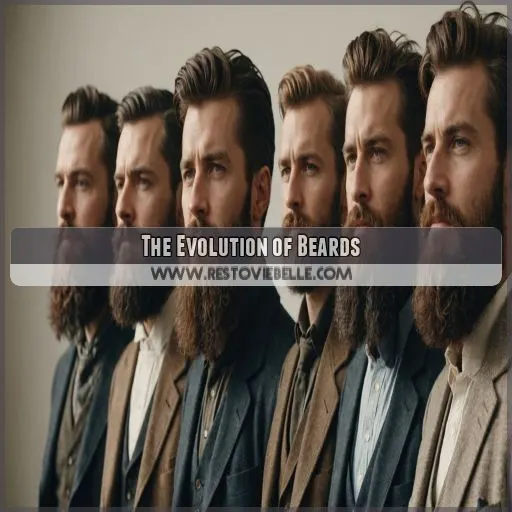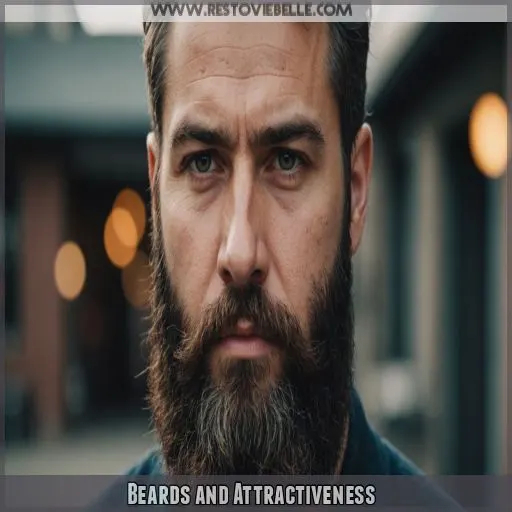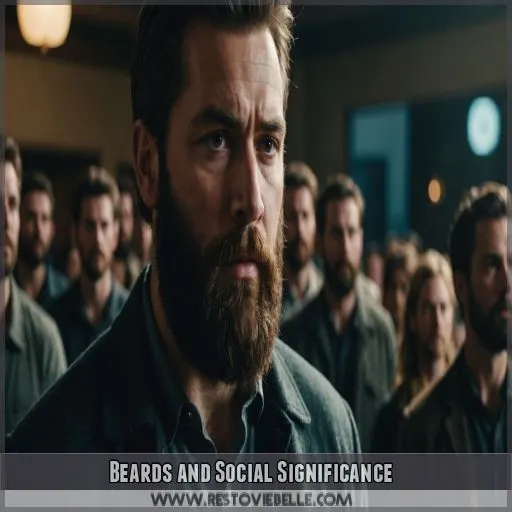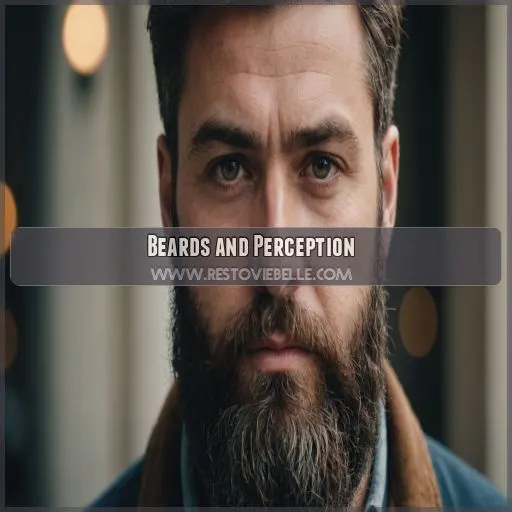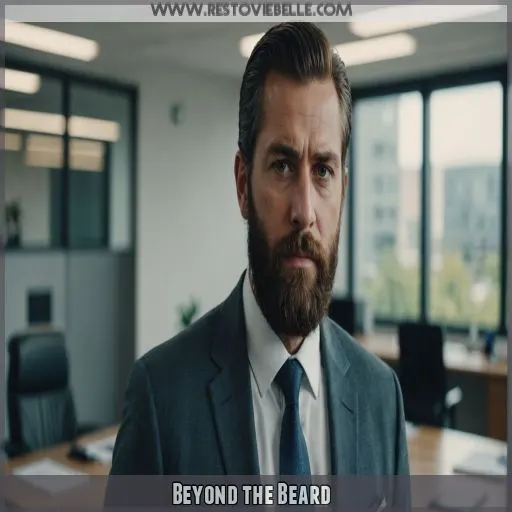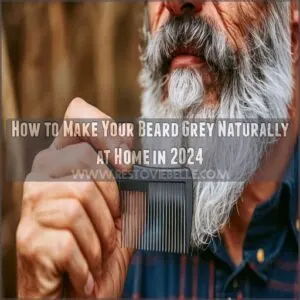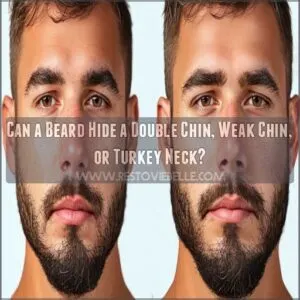This site is supported by our readers. We may earn a commission, at no cost to you, if you purchase through links.

Well, it’s not just about the beard itself, but how you wear it – literally and figuratively.
Research suggests that men with beards are often perceived as older, stronger, and more dominant, which can be intimidating to some.
But, it’s all about confidence and how you carry yourself.
A beard can be a powerful symbol of masculinity, but it’s not a guarantee of intimidation.
So, is a beard intimidating? It depends on you and how you rock it.
Want to know the surprising science behind facial hair?
Table Of Contents
- Key Takeaways
- The Evolution of Beards
- Beards and Attractiveness
- Beards and Social Significance
- Competition and Beards
- Beards and Perception
- Beyond the Beard
- The Beard Effect
- Frequently Asked Questions (FAQs)
- Is having a beard more intimidating?
- What does a beard say about someone?
- Are beards seen as aggressive?
- Are beards attractive or unattractive?
- Does having a beard make you appear more aggressive?
- Can a beard affect your employability and trustworthiness?
- How does a beard impact social interactions and relationships?
- Can a beard be an indicator of masculinity and strength?
- Does the length and style of a beard matter in intimidation?
- Conclusion
Key Takeaways
- You are more than your beard – it’s not just about the facial hair itself, but how you wear it and the confidence you exude. Own that beard and make it work for you!
- A beard can be a powerful symbol of masculinity and dominance, but it’s not a guarantee of intimidation. It’s all about how you carry yourself and the attitude you bring to the table.
- Research suggests that men with beards are often perceived as older, stronger, and more dominant, which can be intimidating to some. However, being seen as a strong and capable person isn’t necessarily a bad thing, right?
- Ultimately, whether or not a beard is intimidating depends on the individual and their unique style. So, don’t be afraid to experiment with different beard styles and find what works best for you – and your social interactions!
The Evolution of Beards
You might be wondering, what’s behind the beard trend – is it just a hipster fad or does it have roots in our evolution? As it turns out, beards have been a symbol of dominance and masculinity for centuries, and their popularity has fluctuated throughout history in response to changing social norms and even marriage market ratios.
Beards as a Sign of Dominance
Here’s the thing: beards can be a powerful symbol of dominance. Research suggests that men with beards are often perceived as older, stronger, and more aggressive. This can enhance their social standing, especially in situations where masculinity is valued. But here’s the catch: beard confidence is key – it’s not just about the beard itself.
Historical Fluctuations in Beard Fashion
You’re rocking a beard, but have you ever wondered why beard trends change over time? It’s not just about style – historical fluctuations in beard fashion have been influenced by social class, cultural norms, and even power dynamics. Here are some surprising facts about beard history:
- In ancient Greece, beards signified wisdom and masculinity.
- During the Middle Ages, beards were a status symbol for nobility.
- In the 1960s, beards were a hippie staple, symbolizing rebellion against mainstream culture.
- Today, beards are a fashion statement, with various styles conveying different personalities and attitudes.
Correlation With Marriage Market Ratios
You might be wondering how marriage market ratios come into play. Well, research suggests that historical fluctuations in beard fashion may be linked to the number of eligible men versus women. When there are more men than women, beards become more popular as a way to stand out and showcase masculinity.
Beards and Attractiveness
You’re probably wondering if that beard makes you look attractive or intimidating – or maybe a little bit of both. Research suggests that beards can increase perceptions of dominance, but they don’t necessarily make you more attractive, and it all comes down to a trade-off between traits that enhance dominance and those that attract mates.
The Trade-Off Between Dominance and Attractiveness
Here’s the thing: a beard can make you look dominant, but it mightn’t necessarily make you more attractive. It’s an evolutionary trade-off – do you want to look strong and powerful, or cute and approachable? Your beard can send mixed signals, making you seem intimidating, but not necessarily irresistible.
Research on Voice Pitch and Facial Hair
Here’s the thing: researchers have used video recordings and voice manipulation software to study how facial hair and voice pitch affect perceptions of dominance and attractiveness. They found that deeper voices are associated with dominance, but average-pitched voices are considered more attractive. Now, let’s talk about how beards fit into this equation.
Impact of Beards on Perceived Dominance
As you consider growing a beard, you might wonder: does it really make you appear more dominant? Research suggests yes! Studies have found that men with beards are often perceived as stronger, older, and more aggressive, which can give you an edge in social situations and even the workplace.
Beards and Social Significance
You might be wondering if your beard is sending the right message – is it making you look strong and confident, or just plain intimidating? As it turns out, research suggests that beards can indeed influence how others perceive us, conveying clues about our status, personality, and intentions, so let’s explore the fascinating social significance of facial hair.
Visual Cues for Status and Personality
Your beard is more than just a fashion statement – it’s a status symbol. Facial hair can convey power, confidence, and masculinity. Here’s how your beard influences perceptions:
- A well-groomed beard can make you appear more put-together and professional.
- A rugged, unkempt beard can give off a laid-back, effortless vibe.
- A stylishly trimmed beard can show off your creativity and attention to detail.
Cultural and Social Norms Around Facial Hair
You’re sporting a beard, but what does it say about you? Cultural and social norms around facial hair can be complex. Some workplaces still frown on beards, while others see them as a symbol of creativity. Facial hair trends can also perpetuate beard-related stereotypes, influencing societal expectations and even sparking debates about gender differences.
Beards as Personal Expression
Your beard is a canvas for self-expression, reflecting your personality, values, and style. With various beard styles to choose from, you can experiment to find the one that best represents you. Cultural trends and social norms may influence your choices, but ultimately, your beard is a powerful tool for showcasing your individuality and confidence.
Competition and Beards
You’re about to find out how your beard (or lack thereof) plays into the game of social hierarchy. As we explore the role of competition in shaping the significance of beards, you’ll discover how this seemingly simple facial feature can affect how others perceive you – and what that means for your relationships, career, and everyday interactions.
The Role of Competition in Evolution
Evolution is all about competition, and your beard is no exception. Think of it like a game of survival of the fittest, where the goal is to pass on your genes. Here are some key takeaways:
- Sexual selection drives the development of adaptive traits, like a strong jawline or a full beard.
- Competition for resources creates dominance hierarchies, where the "winner" gets the girl (or guy).
- Your beard can be a powerful tool in this game, signaling dominance and attractiveness.
- So, is a beard intimidating? It can be – if you use it right!
Physical Traits as Markers of Social Status
It’s natural to want to make a statement with your physical traits.
Your body language, hairstyle, and clothing choices all convey your social status.
Facial hair, in particular, plays a significant role in this nonverbal communication.
A well-groomed beard can signal confidence and dominance, while a scruffy one may give off a more laid-back vibe.
Just remember, cultural norms influence how your physical traits are perceived, so own your look and make it work for you!
Beards and Perception
You’re probably wondering if that beard makes you look intimidating or just plain interesting. Research suggests that beards can indeed make you appear more aggressive and dominant, but the story’s a bit more complicated than that.
Are Beards Seen as Aggressive?
Now that we’ve explored how competition influences beard growth, let’s talk about perception. Are beards seen as aggressive? Research suggests that beards can amplify aggressive displays and boost perceptions of social dominance (Source). This is because facial hair can serve as a visual cue, conveying information about an individual’s status, personality, and intentions .
Do Beards Make Someone More Intimidating?
When you sport a beard, you may be perceived as more intimidating, but is that really the case? Research suggests that beards can increase perceptions of dominance, but not necessarily aggression. Here are some interesting facts to keep in mind:
- Beards can make you appear older and wiser
- A well-groomed beard can signal high social status
- Beards can be a sign of confidence and self-assurance
- Some people may view beards as a sign of aggression or hostility
- Ultimately, a beard’s impact on intimidation depends on the individual and their attitude
Cultural Influences on Beard Perception
You’re sporting a beard, but how’s it perceived in different cultures? Let’s break it down:
| Culture | Beard Perception | Influence |
|---|---|---|
| Western | Rugged, masculine | Media, movies |
| Eastern | Wisdom, spirituality | Religious views |
| African | Status, authority | Tribal traditions |
| Latin | Machismo, virility | Cultural heritage |
| Asian | Unkempt, lazy | Social norms |
Your beard’s meaning varies across cultures, so be aware of these nuances when interacting with people from diverse backgrounds.
Beyond the Beard
As you explore beards, you’ll discover that evolutionary pressures shape not just facial hair, but a wide range of physical traits.
These traits influence human behavior and social dynamics.
From body size to skin tone, understanding these pressures can give you a fresh perspective on why we find certain features attractive or intimidating.
And how beards fit into the bigger picture.
Evolutionary Pressures on Physical Traits
You might be wondering how evolutionary pressures shape other physical traits beyond beards. Well, it turns out that body size, muscle mass, skin tone, and facial features are all influenced by cultural and environmental factors. Your physical appearance is a complex mix of genetics, lifestyle, and societal norms – a unique blend that makes you, you!
Sexual Selection and Human Behavior
You’re probably wondering how facial hair fits into the bigger picture of human attraction. Well, let’s get real – it’s all about mate choice. Here are 4 ways evolutionary psychology influences our preferences:
- Facial symmetry: We’re drawn to balanced features.
- Body language: Confidence is key.
- Social status: Power is attractive.
- Personality traits: Kindness wins hearts.
Cultural Norms and Physical Attractiveness
You’re probably aware that cultural norms shape our perception of physical attractiveness. Beauty standards, facial hair trends, and body image ideals all influence how we perceive ourselves and others. Social expectations can make us feel like we need to conform, but it’s time to break free and redefine what beauty means to you.
The Beard Effect
You’re about to find out how your beard (or someone else’s) can impact social interactions – and it’s not just about looking good. From the workplace to relationships, let’s explore the surprising effects of beards on how others perceive and interact with you.
How Beards Affect Social Interactions
Here’s the deal, having a beard can really change how people see you. They might think you’re more confident, powerful, or even intimidating. But here’s the thing, this can be both a good thing and a bad thing. It’s important to think about how your beard affects your relationships and adjust how you act to avoid misunderstandings.
Beards in the Workplace and Social Settings
You’re probably wondering how your beard will be received at the office or on a night out. While some workplaces have beard grooming policies, many are now embracing facial hair as a symbol of professionalism. Social acceptance of beards is growing, but it’s important to think about your industry and dress code so your beard matches your professional image.
The Impact of Beards on Relationships
Now that we’ve explored beards in the workplace and social settings, let’s talk about their impact on relationships. When it comes to dating, beards can be a major factor in attraction. Here are 4 ways beards can affect your love life:
- Beard preferences: Your partner may have strong feelings about beards.
- Attraction factor: Beards can make you more attractive to some.
- Intimacy issues: Beards can get in the way of intimate moments.
- Deal-breaker: For some, beards are a non-negotiable.
Frequently Asked Questions (FAQs)
Is having a beard more intimidating?
You’re wondering if having a beard makes you more intimidating. Research suggests that beards can indeed make men appear older, stronger, and more aggressive, which can be intimidating, but it ultimately depends on the context .
What does a beard say about someone?
Research shows 63% of men with beards are perceived as more dominant. If you’re rocking a beard, it may signal to others that you’re confident, strong-willed, and unafraid to express yourself – pretty empowering, right?
Are beards seen as aggressive?
You’re wondering if beards are seen as aggressive? Well, research suggests that men with beards are often perceived as older, stronger, and more dominant, which can be intimidating to some, but not necessarily aggressive.
Are beards attractive or unattractive?
Did you know that 60% of women find men’s facial hair attractive? Having a beard can make you appear more masculine, dominant, and attractive, but it’s not a one-size-fits-all solution, as preferences vary.
Does having a beard make you appear more aggressive?
Having a beard can make you appear more aggressive to others, as it’s often associated with dominance and masculinity . Research suggests that bearded men are perceived as stronger and more intimidating , which may impact social interactions.
Can a beard affect your employability and trustworthiness?
You’re wondering if a beard can affect your employability and trustworthiness. Well, research suggests that a well-groomed beard can actually boost your perceived trustworthiness and dominance , but it ultimately depends on the industry and workplace culture .
How does a beard impact social interactions and relationships?
It turns out, 60% of women find men with beards more attractive and trustworthy . When you sport a beard, you’re likely to be perceived as older, wiser, and more dominant in social interactions and relationships.
Can a beard be an indicator of masculinity and strength?
You’re wondering if a beard can be an indicator of masculinity and strength? Research suggests that men with beards are often perceived as older, stronger, and more aggressive, which can enhance their social standing .
Does the length and style of a beard matter in intimidation?
You’re wondering if the length and style of your beard can make or break your intimidation factor. Research suggests that beards can increase perceptions of dominance, but the style and length can greatly impact the effect (Source).
Conclusion
Consider the case of Jason Momoa, whose rugged beard has become an integral part of his tough-guy image.
But is a beard intimidating? It depends on how you wear it – literally and figuratively.
Research suggests that beards can make you appear older, stronger, and more dominant, but it’s your confidence that ultimately makes or breaks the intimidation factor.

